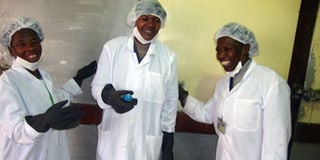Feminine touch at Nairobi mortuary

PHOTO/ARTHUR OKWEMBA/NATION
Three of four attendants at the City Mortuary (from left) Rose Abong’o, Esther Atieno and Grace Kisira.
They are making a mark in a job long dominated by men.
At the City Mortuary, four women have quietly but meticulously been washing, treating and helping in the disposal of unclaimed bodies.
“It is unusual to find women handling dead bodies,” a member of a bereaved family remarks, visibly surprised.
Indeed, working at the mortuary is one of the jobs that have for a long time not featured on the list of options for many people, especially women.
Mortuary attendants’ work is feared by many, with those doing it referred to by derogatory names.
But in the recent past, the job has not only been attracting a good number of men, but an increasing number of women as well.
With the biting unemployment, the Nairobi City Mortuary has been receiving an increasing number of applications for the mortuary attendant position.
And the female mortuary attendants are demolishing long-held stereotypes that certain jobs can only be done by men.
“Initially, my friends thought I was out of my mind when I started doing this job. But now they really encourage me,” says Ms Esther Atieno, a mother of two and one of the four female mortuary attendants.
As I made the decision to come and work here, I kept reassuring myself that all shall be well.” It was at the mortuary that Ms Atieno touched and cleaned a dead body for the first time.
“But what scared me initially and which would have made me abandon this job was the post-mortem process. I had never seen a dissected human body before.”
After several post-mortems that day, some of her colleagues thought she would not turn up the following day. “I did”.
Her biggest encouragement was her colleague, Ms Grace Kisira, the first of the four women to take up the job in early 2008.
“I looked at Grace and said if a fellow woman has held on this far, why not me,” says Ms Atieno.
For Ms Kisira, the mortuary attendant’s job was not her first experience in handling the dead. She had worked at Lang’ata cemetery where she helped in digging graves and burying the dead.
“I had the courage to do it especially after the cemetery experience and participating in mass disposal of unclaimed bodies,” says Ms Kisira.
Dr Robert Ayisi, the City Medical Officer of Health, recalls: “When the women said they were ready to work as mortuary attendants, we were at first not convinced. But we decided to give them a chance.”
The women were taken through a six-month training programme during which they had to interact closely with dead bodies.
Male colleagues thought they would last only a few days and abandon the job.
Very emotional
“When the women started working, their male colleagues thought it was a joke. They laughed it off saying the women will not last a week because they are very emotional and might not be able to handle the heavy workload,” recalls Mr Jacob Nyongesa, the City Mortuary superintendent.
This was informed by past experience when, around 1995, the first woman to be employed as a mortuary attendant resigned after only two hours.
“A majority of women and some men fear going inside the mortuary, leave alone touching a dead body. I knew these ones would not last,” says one of the male attendants.
But, as the women kept reporting for work, the male attendant came to the conclusion that they must have been “well prepared mentally and physically before taking up this job”.
Days turned into weeks and weeks into months, and none of the women showed any signs of surrender. Since then, the four women have not looked back.
Two of them have been promoted to full mortuary attendants, a professional position that qualifies them to receive bodies, preserve them, prepare them for post-mortem process, clean and dress them, and finally release them to the next-of-kin for burial.
“Women refuse to take up some jobs that can help put food on the table. We need to have courage to compete with men in every facet of life,” says Ms Rose Abong’o, an attendant.
Ms Abong’o, a mother of five, is so upbeat about the successes and difference the women have brought at the City Mortuary.
“Tunachapa kazi hata kuliko wanaume (we work better than our male colleagues),” says Abong’o with a broad smile. She started working at the mortuary in 2008.
The other attendant is Elsa Achieng Awour. At 32, she is the youngest of the four attendants. She started work at the mortuary in 2009.
And their presence is reassuring to the public. A bereaved woman who identified herself as Salome remarked: “At least we are happy and at ease that the female attendants clean and dress the dead females.”




